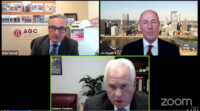Regaining control over the climate crisis will require a change in the way cities are designed and built, noted British architect Sir Norman Foster told global attendees at the COP26 summit in Glasgow, Scotland, in a presentation with John Kerry, President Joe Biden's special climate envoy.
The design leader of major projects such as the Beijing airport, New York City’s Hearst Tower and Apple’s California headquarters, made the comments on Nov. 3, emphasizing that green building standards must adapt to account for a wider range of factors.
“Many of the standards that can rate a building environmentally, like LEED and BREEAM, are to be encouraged,” he says. “They’re about, in many ways, the wellness of the building, environmentally, in terms of its impact on the planet. You’ve got a new range of ratings about wellness, so they’re about the health of those who use the building. What we’re realizing now is that none of these ratings assess the embedded carbon in the materials that make the building. At the same time, they are not factoring in the operational carbon."
Foster adds that he believes cities should be rezoned to promote more traditional mixed neighborhoods, replacing purpose-built, auto-focused areas where people who work in city centers can’t afford to live in them and must instead commute from far away.
He compared Detroit with Copenhagen, Denmark. The cities have similar populations and climates. Copenhagen is older and much more compact, but Detroit, built for cars, uses far more energy. Now amid climate change, Foster says people are rediscovering the benefits of traditional cities, and the importance of their infrastructure.
“If you think about the infrastructure, it’s the urban glue that binds all the individual buildings together,” Foster says. “It’s the boulevards, the green spaces, the public spaces, the plazas, the bridges, the connections. That’s what determines the quality of urban life, and that’s where the investment should go.”
Foster said the global design sector is core to developing needed solutions: “Global warming is a design issue," he said." We have the ability, we have the brains, we have the technology.”
Kerry says he is optimistic about the prospects of private money getting involved in to help finance that development, thanks in part to a commitment from a group of major U.S. banks to contribute $4.61 trillion over 10 years to the effort.
“The private sector is at the table at this COP in a way we’ve never had,” Kerry says.






Post a comment to this article
Report Abusive Comment